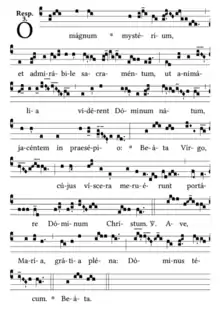O magnum mysterium
O magnum mysterium is a responsorial chant from the Matins of Christmas.


Text
- Latin text
- O magnum mysterium,
- et admirabile sacramentum,
- ut animalia viderent Dominum natum,
- iacentem in praesepio!
- Beata Virgo, cujus viscera
- meruerunt portare
- Dominum Iesum Christum.
- Alleluia!
- English translation
- O great mystery,
- and wonderful sacrament,
- that animals should see the newborn Lord,
- lying in a manger!
- Blessed is the virgin whose womb
- was worthy to bear
- the Lord, Jesus Christ.
- Alleluia!
History
The image of the oxen and donkey next to the crib is found in Isaiah (Isa. 1.3) and is traditionally related to the nativity scene at the birth of Jesus in Luke 2. Luke (Lk 2.7) does not mention animals, but a manger. In the apocryphal Gospel of Pseudo-Matthew, both animals are specifically named. The image continued to spread from the 13th century onwards when it was included in the Golden Legend. It became the most popular symbol for the mystery of the self-abasement of God in his Incarnation. (Phil 2,6–7).
The second part of the responsory relates to the words with which Elizabeth welcomes Mary, mother of Jesus on her visitation (Lk 1.42–43).
Lauridsen's O Magnum Mysterium
O Magnum Mysterium by the American composer Morten Lauridsen was composed in 1994. The piece mimics classic Gregorian choral pieces in its style but with some modern influence as well. Speaking of the piece Lauridsen said "I wanted this piece to resonate immediately and deeply into the core of the listener, to illumine through sound.[1]" The music pulls its lyrics from the responsorial chant shown above. Lauridsen accounts that his inspiration for the piece came from a painting he saw in the Norton Simon Museum titled “Still Life with Lemons, Oranges and a Rose” (1633) by Spanish Baroque artist Francisco de Zurbarán, which Lauridsen said was symbolism for the Virgin Mary. Lauridsen said he worked on the piece over a period of six months and put considerable thinking into a certain dissonant note to comment on the sorrow that the Virgin Mary would later face as her son was killed.[2]
Paus' O Magnum Mysterium
O Magnum Mysterium by the Norwegian composer Marcus Paus was composed in 2007 for marimba and choir. The work has been recorded by The Zurich Chamber Singers as the centerpiece of their album O nata lux, released by Berlin Classics in 2020.[3] The German music critic Jan Brachmann wrote in the Frankfurter Allgemeine Zeitung that the work translates "the harmonious language from soundtracks for mystery thrillers into pious devotion, almost based on the maxim: 'You, Christmas are like a David Lynch film, but with a happy ending and no deaths.'"[4]
References
- "Morten Lauridsen: O Magnum Mysterium". Classic FM. Retrieved 2019-11-17.
- Morten Lauridsen: "O Magnum Mysterium", retrieved 2019-11-17
- "Himmlische Chöre, swingendes Fest" (review), Aachener Zeitung
- Brachmann, Jan (2020-12-10). "Musik zum Advent: Der Ochse küsst des Kindes Fuß". Frankfurter Allgemeine Zeitung.
Ganz ins Dunkel führt die CD „O nata lux“ der Zurich Chamber Singers unter der Leitung von Christian Erny (Berlin Classics/Edel). Sie ist auf mystische Versenkung, auf Einkehr, nicht auf Betäubung angelegt. Ein bisschen auch auf Grusel, etwa beim Norweger Marcus Paus und seiner Vertonung der Weihnachtsantiphon „O magnum mysterium“: Sie überträgt die harmonische Sprache aus Soundtracks für Mystery-Thriller in die fromme Andacht, quasi nach der Parole: „Du, Weihnachten ist wie ein Film von David Lynch, aber mit Happy End und ohne Tote.“
External links
| Wikimedia Commons has media related to O magnum mysterium. |
- O magnum mysterium: Text, translations and list of free scores by several composers at the Choral Public Domain Library (ChoralWiki)
- O Magnum Mysterium by Grex Vocalis
- O magnum mysterium on YouTube by Morten Lauridsen sung by the Choir of King's College, Cambridge
- O magnum mysterium on YouTube by Morten Lauridsen sung by Lumen Valo
- O magnum mysterium on YouTube by Morten Lauridsen, arranged for concert band by H. Robert Reynolds
- O magnum mysterium on YouTube by Tomás Luis de Victoria
- O magnum mysterium on YouTube by Giovanni Gabrieli
- O magnum mysterium on YouTube by Giovanni Pierluigi da Palestrina
- O magnum mysterium on YouTube by Francis Poulenc
- O magnum mysterium on YouTube by Margaret Rizza
- O magnum mysterium on YouTube by Ivo Antognini
- O magnum mysterium on YouTube by Manolo Da Rold
- O magnum mysterium (Serenity) on YouTube by Ola Gjeilo
- O magnum mysterium on YouTube by Chris Artley
- O magnum mysterium on YouTube by Kevin Memley
- O magnum mysterium on YouTube by David Conte